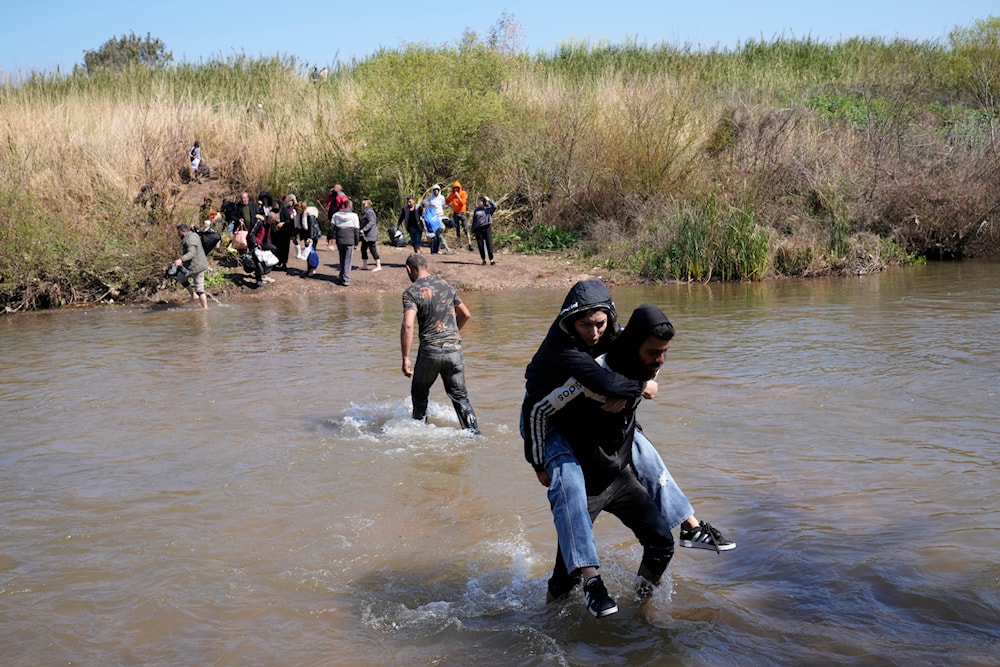21K+ flee Syria violence, Lebanese delegation Damascus visit postponed
The Lebanese Defense Minister's visit to Syria has been postponed at the request of the Syrian side.
-

Syrian families cross a river marking the border between Syria and northern Lebanon in Heker al-Daher village in Akkar province on March 11, 2025 (AP)
The visit of Lebanese Defense Minister Michel Menassa and his accompanying delegation to Syria has been postponed at Syria's request, sources revealed to Al Mayadeen on Wednesday.
A Lebanese official had told AFP on Monday that Menassa would visit Syria on Wednesday to discuss recent tensions along the border between the two countries.
"The defense minister will head a security delegation to Damascus to meet with his counterpart, Marhaf Abu Qasra," the official said.
The aim of the visit was to "discuss ways to manage the situation at the border, strengthen bilateral coordination and prevent cross-border aggression," the official added.
Prime Minister Nawaf Salam had also announced that Menassa and his security delegation were scheduled to visit Damascus on Wednesday.
21,000 people flee sectarian violence in Syria
Yesterday, the United Nations refugee agency reported that over 21,000 people have fled sectarian violence in Syria this month, seeking refuge in neighboring Lebanon.
The surge in displacement follows days of intense violence in the coastal region starting on March 6, during which hundreds of Alawite civilians were killed in what observers have described as sectarian assaults and "field executions".
Many families fleeing the violence are crossing rivers and unofficial border points on foot, arriving in Lebanon exhausted and traumatized, the UN agency highlighted.
"The hostilities... in early March continue to displace people on a steady daily basis" into northern Lebanon, the UNHCR statement said, reporting "21,637 new arrivals from Syria," citing figures provided by Lebanese authorities and the Lebanese Red Cross.
Additionally, the Syrian Observatory for Human Rights reported that at least 1,500 civilians, mostly Alawites, were killed, with fingers pointed at security forces and allied groups for their roles in "field executions, forced displacement, and burning of homes."
The UNHCR statement noted that "fleeing families are continuing to cross unofficial border crossing points including through rivers on foot, and are arriving exhausted, traumatised, and hungry."
The agency also pointed to "ongoing reports of insecurity hindering people's movements before they reach Lebanon." It further noted that around 390 Lebanese families were among the new arrivals.
On another note, the US Office of the Director of National Intelligence reported that massacres in western Syria are attributed to both Syrian interim government forces and armed groups.
In its 2025 Annual Threat Assessment report released on Tuesday, the agency stated that forces from the HTS-led interim government, along with elements of Hurras al-Din and other armed groups, were involved in violence and extrajudicial killings in northwestern Syria in early March 2025, primarily targeting religious minorities, leading to the deaths of at least 1,500 people, including Alawite and Christian civilians, according to the Syrian Observatory for Human Rights.
The report also highlighted that the power shift in Syria has fostered conditions for prolonged instability, which could aid in the resurgence of the Islamic State (ISIS) and other extremist terror groups.

 3 Min Read
3 Min Read








